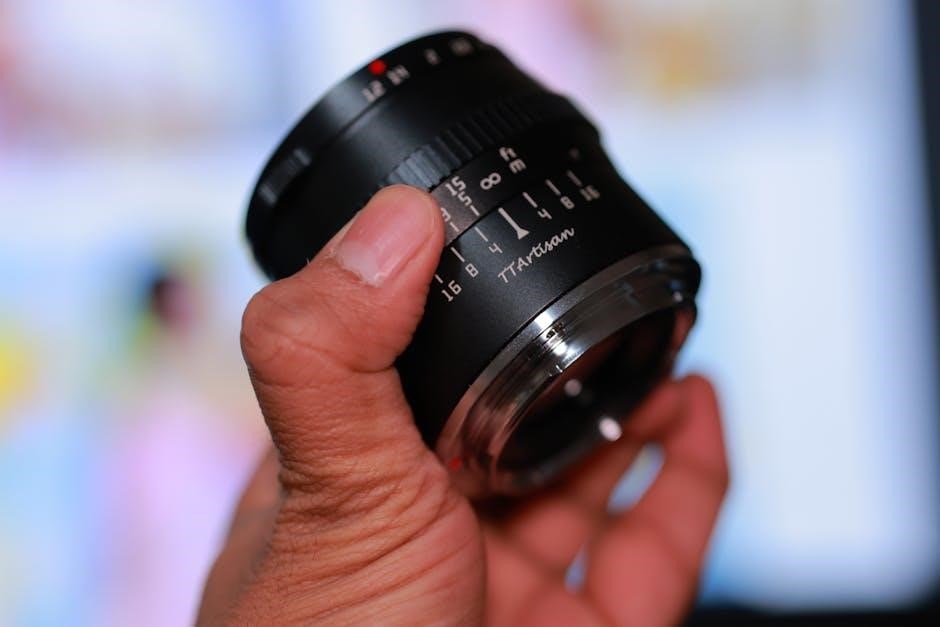
Amateur radio licensing is essential for legal operation, ensuring safe and responsible communication․ It offers a gateway to a vibrant community, fostering experimentation and global connectivity․
1․1 Importance of Licensing
Licensing is crucial for legal operation, ensuring operators understand safety, regulations, and responsible communication․ It fosters a community of skilled individuals, promoting experimentation and global connectivity while adhering to legal standards․
1․2 Brief History of Amateur Radio
The origins of amateur radio trace back to the late 19th century, with pioneers like Guglielmo Marconi and Nikola Tesla experimenting with wireless communication․ The first amateur radio licenses were issued in the early 20th century, recognizing enthusiasts’ contributions to radio technology․ Over time, amateur radio evolved, with the establishment of organizations like the American Radio Relay League (ARRL) in 1914․ Amateur radio played a significant role in emergencies and technological advancements, fostering global communication and innovation․ Today, it remains a vibrant hobby, blending tradition with modern technology, offering a unique way to connect and experiment with radio communication worldwide․

Types of Amateur Radio Licenses
Amateur radio licenses include Technician, General, and Extra Class․ Each offers varying levels of operating privileges, with Technician for beginners, General for intermediate, and Extra for advanced operators․
2․1 Technician Class License
The Technician Class License is the entry-level certification for amateur radio operators․ It requires passing a 35-question exam covering basic radio theory, operating practices, and FCC regulations․ Topics include radio safety, electrical concepts, and communication techniques․ This license grants access to VHF and UHF frequencies, ideal for local communication․ Study materials like the ARRL Ham Radio License Manual and online platforms are widely used․ Passing the Technician exam is the first step to exploring the world of amateur radio, offering a foundation for further advancements in licensing and operational capabilities․ It’s designed for beginners, ensuring a smooth introduction to ham radio operations․
2․2 General Class License
The General Class License is the intermediate level of amateur radio certification․ It requires passing a more challenging 35-question exam, building on the Technician Class knowledge․ Topics expand to include advanced radio theory, signal propagation, and operating practices․ This license unlocks access to a wider range of frequencies, enabling global communication․ Study guides like the ARRL Ham Radio License Manual and online resources are recommended․ Earning the General Class License enhances operational privileges, allowing for more complex and rewarding ham radio activities․ It is a significant step for those seeking to deepen their involvement in amateur radio and explore its advanced capabilities․
2․3 Extra Class License
The Extra Class License is the highest level of amateur radio certification, requiring a rigorous 50-question exam․ It covers advanced topics like digital modulation, antenna design, and regulatory policies․ The license offers full operating privileges on all amateur frequencies, enabling participation in complex operations and contests․ Study materials, such as the ARRL Extra Class License Manual, are essential for preparation․ Achieving this license demonstrates extensive knowledge and commitment to amateur radio, allowing operators to contribute to the community at the highest level and explore the most advanced aspects of ham radio communication and experimentation․

Study Materials and Resources
Popular study guides like the ARRL Ham Radio License Manual and online platforms like Hamstudy;org provide comprehensive resources for understanding amateur radio concepts and exam preparation․
3․1 Popular Study Guides
The ARRL Ham Radio License Manual is a top choice for amateur radio enthusiasts, offering detailed explanations and practice questions․ Ria Jairam’s Technician Class License Guide provides a clear, structured approach for newcomers․ Additionally, the No Nonsense Technician Class License Study Guide is praised for its concise and focused preparation material․ These guides cover essential topics such as radio theory, operating practices, and FCC regulations, ensuring comprehensive understanding․ They are widely recommended for those aiming to pass their exams and become licensed operators․
3․2 Online Platforms and Tools
Popular online platforms like HamStudy․org offer interactive study materials and practice exams, simplifying exam preparation․ Reddit communities such as r/amateurradio provide valuable discussions and resources․ YouTube channels like Rias Shack Ham Radio share tutorials and tips․ These tools complement traditional study guides, offering flexible learning options for aspiring operators․ They cover exam questions, technical concepts, and practical advice, ensuring a well-rounded preparation experience․
Exam Preparation Strategies
Master the question pool, use online simulators, and join study groups to enhance your preparation․ Focus on understanding concepts and practical applications for success․
4․1 Understanding the Question Pool
The question pool is a critical resource for exam preparation, containing all possible questions that may appear on the FCC amateur radio license exam․ It is regularly updated to reflect current regulations, technologies, and practices․ By studying the question pool, candidates can familiarize themselves with the scope and difficulty of the test․ This helps identify weak areas that need more attention․ Many study guides and online platforms organize their materials based on the question pool, making it easier for learners to focus on relevant topics․ Regularly reviewing and practicing with these questions enhances confidence and improves test-taking skills․ Consistent practice ensures readiness․
4․2 Practice Exams and Simulators
Practice exams and simulators are indispensable tools for effective exam preparation․ They mimic real test conditions, helping candidates assess their knowledge and familiarity with the question format․ Platforms like Hamstudy․org and QRZ․com offer interactive practice exams, allowing users to identify weak areas and track progress․ Simulators provide realistic test environments, enhancing time management and reducing anxiety․ Regular use of these tools builds confidence and ensures readiness for the actual FCC exam․ Reviewing missed questions and focusing on challenging topics are key strategies for success․ Utilizing practice exams and simulators is a proven method to achieve high scores and obtain an amateur radio license․

Operating Practices and Ethics
Responsible communication, adhering to regulations, and respecting fellow operators are cornerstone ethics․ Proper equipment use, clear transmissions, and courtesies ensure a positive experience for all amateur radio enthusiasts․
5․1 Basic Radio Operating Techniques
Mastering basic radio operating techniques is crucial for effective communication․ This includes using proper call signs, adhering to channel protocols, and maintaining clear, concise speech․ Operators should minimize interference by adjusting equipment settings and avoiding unnecessary transmissions․ Understanding radio etiquette, such as allowing others to join conversations and using appropriate language, fosters a respectful environment․ Familiarity with basic operating modes, like voice, Morse code, and digital communication, enhances versatility․ Regular practice and adherence to FCC guidelines ensure compliance and promote a positive amateur radio community․ These foundational skills are essential for all licensed operators, from beginners to experienced hams․
5․2 Safety and Legal Considerations
Safety and legal compliance are paramount in amateur radio operations․ Operators must adhere to FCC regulations, including proper use of call signs and frequency allocations․ RF exposure limits, as outlined by the FCC, must be respected to ensure operator and public safety․ Proper antenna installation and equipment maintenance are critical to prevent accidents․ Legal considerations include avoiding unauthorized transmissions, respecting privacy, and following international communication laws․ Operators should also be aware of emergency communication protocols and ethical standards․ Compliance with these guidelines ensures responsible use of amateur radio privileges and protects both the operator and the community․

Choosing the Right Equipment
Selecting the right amateur radio equipment is crucial, depending on your skill level and operational needs․ Start with essential gear like transceivers, antennas, and accessories․ Advanced equipment offers enhanced capabilities for experienced operators, ensuring optimal performance and compliance with legal standards․
6․1 Essential Gear for Beginners
Starting with amateur radio requires basic equipment to ensure effective communication․ A transceiver, either handheld or desktop, is the core component, allowing transmission and reception of signals․ A reliable antenna is crucial for optimal performance, with options ranging from simple dipoles to more advanced designs․ A power supply ensures consistent energy delivery, while cables and connectors maintain signal integrity․ Additionally, a study guide or manual is indispensable for understanding operations and legal requirements․ These essentials provide a solid foundation for newcomers, enabling them to explore the world of amateur radio confidently and responsibly․
6․2 Advanced Equipment for Experienced Operators
Experienced amateur radio operators often upgrade to specialized equipment for enhanced performance․ High-frequency transceivers with advanced features like dual receivers and spectrum scopes are popular․ Directional antennas, such as beam antennas, improve signal strength and selectivity․ Amplifiers boost transmission power, enabling long-distance communication․ Digital mode interfaces facilitate operations like RTTY, PSK, and JT65․ Filters minimize interference, while software-defined radios (SDRs) offer unparalleled flexibility․ These tools allow seasoned operators to explore complex modes, experiment with new techniques, and optimize their setups for specific applications, ensuring superior communication quality and versatility in their amateur radio pursuits․
Joining the Amateur Radio Community
Joining local clubs, attending meetings, and participating in events fosters connections and knowledge sharing․ Online forums and groups further expand networking opportunities for amateur radio enthusiasts globally․
7․1 Local Clubs and Organizations
Local amateur radio clubs provide invaluable support and camaraderie for newcomers and experienced operators․ These organizations often host license preparation courses, workshops, and hands-on training sessions․ Many clubs participate in community service activities, such as emergency communications and public events, offering practical experience․ Members frequently share equipment, knowledge, and tips, creating a collaborative environment․ Joining a local club is an excellent way to build skills, stay updated on regulations, and connect with fellow enthusiasts․ Clubs also organize amateur radio exams, making the licensing process more accessible and less intimidating for aspiring operators․
7․2 Online Forums and Groups
Online forums and groups are invaluable resources for amateur radio enthusiasts․ Platforms like Reddit’s r/HamRadio and specialized Facebook groups provide spaces for discussion, knowledge sharing, and support․ These communities often feature threads on licensing, equipment, and operating practices․ Members can ask questions, share experiences, and receive feedback from seasoned operators․ Additionally, online groups frequently host study sessions, exam preparation tips, and updates on the latest amateur radio trends․ They also serve as networking hubs, connecting operators worldwide and fostering collaboration on projects and events․ Engaging with these forums can enhance learning and deepen involvement in the amateur radio hobby․
Next Steps After Licensing
After obtaining your amateur radio license, consider upgrading to higher classes or participating in events like Field Day․ Explore advanced techniques and join clubs for networking․
8․1 Upgrading Your License
Upgrading your amateur radio license can expand your privileges and opportunities․ The Technician Class is the entry point, but advancing to General or Extra Class licenses offers greater frequency access․
Studying with resources like the ARRL Ham Radio License Manual or online platforms can help you prepare․ Practice exams and understanding the question pool are key strategies․
Upgrading not only enhances your operational capabilities but also deepens your knowledge of radio theory and techniques․ Many hams find the challenge rewarding and enjoy the enhanced community recognition․ Start your journey to higher licenses today and unlock new possibilities in amateur radio!
8․2 Participating in Ham Radio Events
Participating in ham radio events enriches your hobby experience and enhances your skills․ Events like Field Day, contests, and emergency communications exercises allow you to practice real-world operations․ Workshops and training sessions offered by clubs or organizations help refine techniques and stay updated on trends․ Many events also foster camaraderie, connecting you with fellow operators․ Whether it’s a local meet-up or a global contest, these activities provide opportunities to apply your knowledge and contribute to the community․ Engaging in such events not only improves your proficiency but also strengthens the amateur radio network’s preparedness for public service and emergencies․